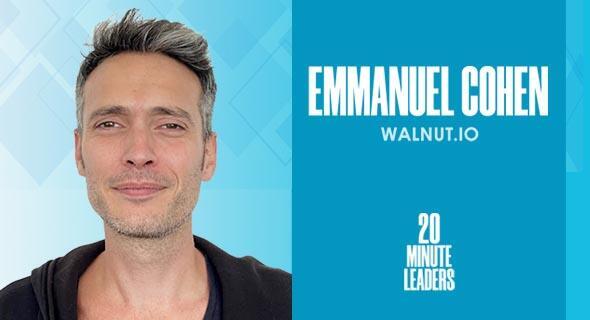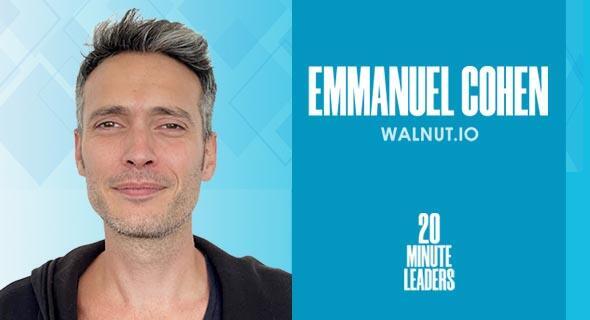
20-Minute Leaders
“Social media is a playground. It's not a threat.”
Surprising consumers is Emmanuel Cohen’s goal in marketing, as he shares that people are tired of the classic patterns.
Surprising consumers is Emmanuel Cohen’s goal in marketing, as he shares that people are tired of the classic patterns. He showed the wisdom of that approach with an employer branding video for Walnut.io, where he is head of marketing, that went viral in recent months. Cohen explains that it was scary to publish the ad that he wrote in an hour and was finished in a week, but taking risks is important, especially in marketing. He says that social media marketers need to see the platforms as playgrounds where they can try things and learn as they go. Cohen shares that marketing is so dynamic that you must learn all the time, but that’s also the beauty of it. He also says marketers need to understand the rules very well and earn trust within their company before they try to break those rules to surprise viewers.
I saw Walnut's recent viral video that you're starring in. Tell me a little bit about this video and how that plays into your greater thinking through marketing.
There are many factors that made the video successful. First, it was the timing. We had to make it quickly because we jumped on many TV trends. The show just finished.
I wrote it in one hour, showed it to others in the office, and they laughed. I made a phone call to a director. Two days after, we were shooting it. A few days after, it was on the air. That's the beauty. It was not overprepared. It was very intuitive.
I think consumers are very tired of classic marketing. The goal is always to surprise them and to break the rules. All these employer branding campaigns in the last year in Israeli high-tech, it was madness. What I tried to do is to break the rules, selling the company without really selling it.
How do you strategically create a culture or process in the company that enables this type of work?
I'm lucky the CEO is a marketer. He recognizes very easily what's good marketing. I think we are building a very strong brand. Part of it is understanding that even a B2B consumer, a VP sales or a CRO in a big company, is still a human being. We have a B2B approach that is very similar to B2C: talk to people straightforward, be a bit funny about what we do. If you look at our social media, everything is a bit cynical. We understand that you understand what we are doing, so let's make it fun.
I believe you create an emotional connection with the audience through the messaging and storytelling. If you come with a different angle, a more approachable style, a bit of humor, a bit of self-derision, and a bit of charm, that's the way I try to market the company. So far, it's doing well.
When the sales team goes on a call, clients say, "Oh, I love what you are doing." They already feel connected to the brand, and it allows the sales team to sell much more easily.
How do you define KPIs when you're trying to break the rules?
There are many ways to measure. This specific video was in Hebrew; it's very specific to the Israeli market. There you will measure the amount of followers, amount of CV connections that added me on LinkedIn. On the same day, I had 5,000 new connections on LinkedIn.
Recently with our round-B, you can see the number of followers jumping, the visits to the website jumping. You have a lot of metrics you can take together to measure the success of one specific item.
Take me back to the moment where you're writing that script. Is it just a morning that you say, "Today I'm going to try something"? Or is it any methodology you have?
I think there is both. First, you need to know the rules. You can't break the rules if you don't know them. The first thing I do when I create a campaign is I go and see what the other companies did. I see the patterns. Then I just start writing, trying to find the right pattern and understand where are the flaws in the more conventional employer branding. Then I just jump on them and tweak them around. I have understood social for a long time, and I know what people really react to instinctively. The goal at the end of the day is to keep the watcher watching through the full thing.
You have the building blocks I learned from working with the other companies. Then there are the emotional triggers, then I make it a joke on me. Then I keep moving. Every 10 seconds, you have something else. Even if you're not a fan of the show, you will understand some of the jokes. If you are working in high tech, you will understand the pattern breaking. No matter what angle you are looking at it, there is something for you.
How long did it take from the moment you had the idea to the moment it aired?
It took 10 days, maybe. The reason it took 10 days is because the TV show told me, "You can publish it only after the show finished airing.” But it was ready after a week.
How are you balancing perfectionism versus timeliness here?
One of the biggest marketers’ problems is not taking risks. If you wait for something to be perfect, you will never do it. Marketing is something that is dynamic. You publish, you try, you learn all the time. The goal is to be as close to perfection as you can, without expecting perfection.
We had three versions of the ad. We went back and forth with the director, and we got to a point that we said, "This is good enough." I won't lie to you, when I pressed the publish button I was scared because it's an ad I wrote, that I star in. I'm not an actor. But if you don't take risks, you don't do anything.
That's something I love from WIX. They had a poster saying, "Avoiding mistakes costs more than making them." You need to be ready to do mistakes. You need to be ready for people to criticize you, but otherwise you don't learn. You have to learn all the time. That's the beauty of marketing.
How did you realize that your passion is in marketing and tech?
I was always fascinated with marketing. Since I'm a kid, TV ads were something I always found ridiculous, but exciting. Then I started working at WIX and you see the simple post can go crazy and a campaign that all the company worked on is a flop.
I tried, I studied. I presented in the social media back then; I analyzed the reaction. It's fascinating to understand what people react to and why. That's all marketing. It's about the emotion; it's about making people react.
What are some tips you have for social media marketers?
The most important tip is social media is a playground. It's not a threat. When you are publishing something on social media, after that, you have another item. If you fail, nothing happens. You need to be willing to take risks, try stuff, and understand how people react to each item.
If you are trying to create perfect stuff, you will publish one post a week, and it won't probably succeed because you worked on it too much. Social media is really the most interesting lab to learn about your users. It's very dynamic.
This willingness to try and fail, and nothing happens: do others in the organization see it that way? Obviously, people don't unfollow a page because of a post that isn't going viral. But could the failure also stem from them being measured by people in the organization who don't realize it's okay to try and fail?
In the company and outside the company is the same game. You need to be smart enough to show that you know what you do, even if you fail. When your followers love you enough and people in the company trust you enough based on your former results, the wider you can get. You don't just try stuff. You know the rules, you learn the game, and then you can start playing with what's borderline and playing with a bit of creativity. You can't just go wide in the beginning. You need to know what you do in order to break the rules.
Michael Matias, Forbes 30 Under 30, is the author of Age is Only an Int: Lessons I Learned as a Young Entrepreneur. He studies Artificial Intelligence at Stanford University, is a Venture Partner at J-Ventures and was an engineer at Hippo Insurance. Matias previously served as an officer in the 8200 unit. 20MinuteLeaders is a tech entrepreneurship interview series featuring one-on-one interviews with fascinating founders, innovators and thought leaders sharing their journeys and experiences.
Contributing editors: Michael Matias, Megan Ryan















